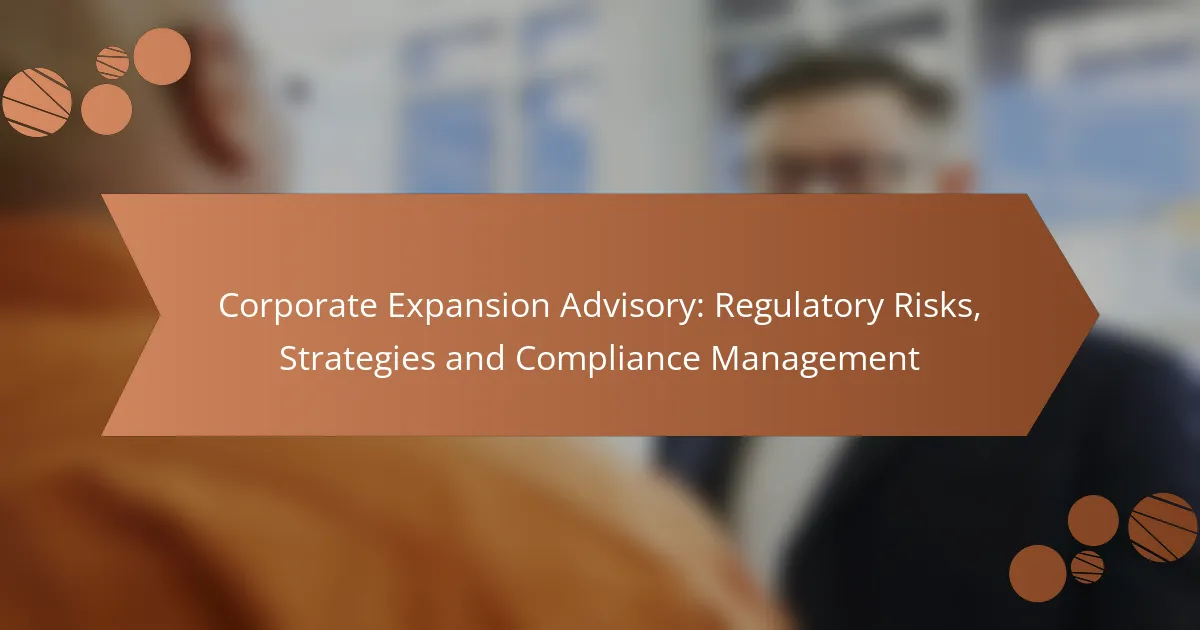Corporate expansion presents significant opportunities, but it also carries the risk of compliance failures that can jeopardize success. Understanding regulatory requirements, managing risks effectively, and fostering clear communication among stakeholders are essential to mitigate these risks. By learning from past failures and implementing proactive measures, companies can navigate the complexities of expansion while ensuring adherence to local laws and standards.

What are the common compliance failures in corporate expansion?
Common compliance failures in corporate expansion often stem from inadequate understanding of regulatory requirements, insufficient risk management, and poor communication among stakeholders. These failures can lead to significant legal and financial repercussions, impacting the overall success of the expansion efforts.
Regulatory oversight failures
Regulatory oversight failures occur when companies overlook or misinterpret the legal requirements in new markets. This can happen due to a lack of thorough research or reliance on outdated information, which may result in non-compliance with local laws.
To mitigate these risks, businesses should establish a dedicated compliance team that stays updated on regulatory changes. Regular audits and consultations with local legal experts can also help ensure adherence to applicable laws.
Inadequate risk assessments
Inadequate risk assessments can lead to unanticipated challenges during corporate expansion. Companies often fail to identify potential risks related to market entry, such as financial instability or cultural differences, which can hinder operations.
To avoid this pitfall, organizations should conduct comprehensive risk assessments that evaluate both internal and external factors. Utilizing frameworks like SWOT analysis can help identify strengths, weaknesses, opportunities, and threats in the new market.
Insufficient training programs
Insufficient training programs can result in employees being unprepared for compliance-related tasks in new regions. Without proper training, staff may inadvertently violate regulations, leading to costly penalties.
Implementing robust training initiatives that cover local laws, compliance protocols, and ethical standards is crucial. Regular refresher courses and assessments can help reinforce knowledge and ensure ongoing compliance.
Failure to adapt to local laws
Failure to adapt to local laws is a critical compliance issue that can derail expansion efforts. Companies may assume that their existing practices are sufficient, ignoring the nuances of local regulations.
To address this, businesses should tailor their operations to align with local legal requirements. Engaging local legal counsel can provide insights into necessary adaptations and help avoid compliance breaches.
Miscommunication among stakeholders
Miscommunication among stakeholders can lead to misunderstandings about compliance responsibilities and expectations. This often results in fragmented efforts and inconsistent application of compliance measures across the organization.
Establishing clear communication channels and regular updates among all stakeholders is essential. Utilizing project management tools can help ensure that everyone is aligned and informed about compliance objectives and changes in regulations.

How can companies avoid compliance failures during expansion?
Companies can avoid compliance failures during expansion by implementing proactive measures that ensure adherence to local regulations and standards. This involves regular audits, comprehensive training, local legal expertise, and effective communication strategies.
Implement regular compliance audits
Regular compliance audits are essential for identifying potential risks and ensuring adherence to local laws. These audits should be conducted at least annually, but more frequent assessments may be necessary in high-risk areas or industries.
During an audit, companies should evaluate their policies, procedures, and practices against local regulations. This helps to uncover gaps and areas for improvement, allowing for timely corrective actions.
Develop comprehensive training initiatives
Comprehensive training initiatives are crucial for ensuring that employees understand compliance requirements. Training should be tailored to the specific regulations of the region where the company is expanding, covering topics such as data protection, labor laws, and environmental regulations.
Consider using a mix of training formats, including online courses, workshops, and hands-on sessions. Regular refresher courses can help keep compliance top of mind and adapt to any changes in regulations.
Engage local legal experts
Engaging local legal experts is vital for navigating the complexities of compliance in new markets. These professionals can provide insights into local laws, cultural nuances, and industry-specific regulations that may not be immediately apparent to outsiders.
Establishing a relationship with local legal counsel can also facilitate smoother operations and help mitigate risks associated with non-compliance. This can include ongoing consultations and reviews of company practices.
Establish clear communication channels
Clear communication channels are essential for ensuring that compliance information flows effectively throughout the organization. Companies should establish protocols for reporting compliance issues and encourage employees to voice concerns without fear of retaliation.
Utilizing tools such as internal newsletters, dedicated compliance portals, and regular meetings can enhance awareness and understanding of compliance obligations. This transparency fosters a culture of accountability and vigilance regarding compliance matters.

What lessons can be learned from past corporate expansion failures?
Past corporate expansion failures highlight the critical importance of understanding market dynamics, adapting strategies, and engaging stakeholders. Companies that neglect these aspects often face significant setbacks, including financial losses and damaged reputations.
Importance of thorough market research
Thorough market research is essential for identifying potential risks and opportunities in new markets. Companies should analyze local consumer behavior, competitive landscapes, and regulatory environments to make informed decisions. For example, a tech firm expanding into Eastern Europe must consider local preferences and compliance with EU regulations.
Effective market research often involves both qualitative and quantitative methods, such as surveys, focus groups, and data analysis. Investing in comprehensive studies can prevent costly missteps and ensure alignment with market demands.
Need for adaptable business strategies
Adaptable business strategies are crucial for responding to unexpected challenges during expansion. Companies should develop flexible plans that allow for adjustments based on real-time feedback and market conditions. For instance, a retail chain might need to alter its product offerings based on regional tastes and preferences.
Establishing a culture of agility within the organization can facilitate quicker responses to market changes. Regularly reviewing and updating strategic plans can help businesses stay relevant and competitive in dynamic environments.
Value of stakeholder engagement
Engaging stakeholders is vital for successful corporate expansion. This includes not only investors but also employees, customers, and local communities. Building strong relationships can foster trust and support, which are essential for overcoming challenges in new markets.
Effective stakeholder engagement strategies might involve regular communication, feedback mechanisms, and community involvement initiatives. Companies that prioritize these relationships often experience smoother transitions and greater long-term success.

What are notable case studies of compliance failures?
Notable case studies of compliance failures highlight the significant consequences businesses can face when they neglect regulatory requirements. These examples illustrate the importance of understanding local laws and adapting strategies accordingly to avoid costly mistakes.
Walmart’s expansion in Germany
Walmart’s attempt to enter the German market in the late 1990s serves as a cautionary tale of compliance failure. The company faced challenges related to labor laws, cultural differences, and competition regulations that it underestimated. Walmart’s failure to adapt its business model to local expectations led to significant financial losses and its eventual exit from Germany in 2006.
Key lessons from this case include the necessity of thorough market research and compliance with local labor laws, which differ significantly from those in the U.S. Companies should prioritize understanding local consumer behavior and regulatory frameworks before expanding internationally.
Uber’s regulatory challenges in Europe
Uber has encountered numerous regulatory challenges across Europe, particularly regarding its classification of drivers as independent contractors. This classification has led to legal battles in several countries, including the UK and France, where courts have ruled that drivers should be considered employees entitled to benefits and protections.
To navigate such complexities, companies like Uber must engage with local authorities and adapt their business models to comply with regional labor laws. Understanding the nuances of each market’s regulations is crucial to avoid costly legal disputes and operational disruptions.
Google’s data privacy issues in the EU
Google’s struggles with data privacy regulations in the European Union, particularly under the General Data Protection Regulation (GDPR), highlight the importance of compliance in the tech industry. The company has faced substantial fines for failing to adequately protect user data and for not being transparent about data collection practices.
This case underscores the need for businesses to implement robust data protection measures and ensure compliance with local privacy laws. Companies should regularly audit their data practices and invest in training to foster a culture of compliance among employees.

What frameworks can guide compliance in corporate expansion?
Compliance in corporate expansion can be effectively guided by established frameworks that help organizations navigate legal and regulatory requirements. These frameworks provide structured approaches to identify risks, implement controls, and ensure adherence to applicable laws across different jurisdictions.
Risk management frameworks
Risk management frameworks are essential for identifying, assessing, and mitigating potential compliance risks during corporate expansion. Common frameworks include ISO 31000 and COSO, which offer guidelines for establishing a risk management process that aligns with business objectives.
When implementing a risk management framework, consider conducting a thorough risk assessment that evaluates both internal and external factors. This assessment should prioritize risks based on their potential impact and likelihood, allowing organizations to allocate resources effectively to address the most critical areas.
Compliance checklists
Compliance checklists serve as practical tools to ensure that all regulatory requirements are met during corporate expansion. These checklists can be tailored to specific industries and jurisdictions, covering areas such as labor laws, environmental regulations, and financial reporting standards.
To create an effective compliance checklist, start by identifying the relevant regulations for your target market. Include key compliance steps, deadlines, and responsible parties to streamline the process. Regularly update the checklist to reflect any changes in regulations or business operations, ensuring ongoing compliance as the company expands.

How does corporate culture impact compliance during expansion?
Corporate culture significantly influences compliance during expansion by shaping employee behaviors and attitudes towards regulations. A strong culture that prioritizes ethical practices fosters adherence to compliance requirements, while a weak culture may lead to oversight and violations.
Understanding corporate culture
Corporate culture encompasses the values, beliefs, and behaviors that characterize an organization. It affects how employees perceive compliance and their willingness to follow regulations. A culture that emphasizes integrity and accountability encourages staff to prioritize compliance in their daily operations.
Key elements of compliance-oriented culture
To cultivate a compliance-oriented culture, organizations should focus on several key elements: leadership commitment, clear communication, and employee training. Leadership must model ethical behavior and actively support compliance initiatives. Regular training sessions ensure that employees understand regulations and the importance of compliance.
Examples of cultural impact on compliance
For instance, a company that rewards ethical behavior and compliance may see lower rates of violations compared to one that prioritizes profits over ethics. In industries like finance or healthcare, where regulations are stringent, a strong compliance culture can prevent costly fines and reputational damage.
Common pitfalls to avoid
Organizations often overlook the importance of ongoing communication about compliance. Failing to engage employees in discussions about ethical practices can lead to misunderstandings and non-compliance. Additionally, neglecting to adapt the corporate culture to local regulations during expansion can result in significant compliance failures.



